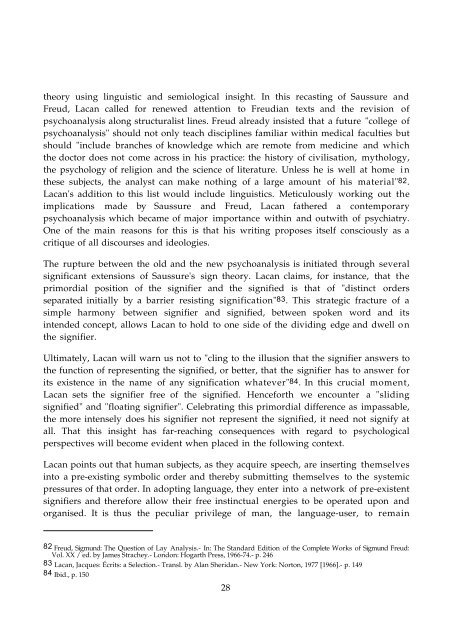Madness in English-Canadian Fiction - ub-dok - Universität Trier
Madness in English-Canadian Fiction - ub-dok - Universität Trier
Madness in English-Canadian Fiction - ub-dok - Universität Trier
Create successful ePaper yourself
Turn your PDF publications into a flip-book with our unique Google optimized e-Paper software.
theory us<strong>in</strong>g l<strong>in</strong>guistic and semiological <strong>in</strong>sight. In this recast<strong>in</strong>g of Saussure and<br />
Freud, Lacan called for renewed attention to Freudian texts and the revision of<br />
psychoanalysis along structuralist l<strong>in</strong>es. Freud already <strong>in</strong>sisted that a future "college of<br />
psychoanalysis" should not only teach discipl<strong>in</strong>es familiar with<strong>in</strong> medical faculties but<br />
should "<strong>in</strong>clude branches of knowledge which are remote from medic<strong>in</strong>e and which<br />
the doctor does not come across <strong>in</strong> his practice: the history of civilisation, mythology,<br />
the psychology of religion and the science of literature. Unless he is well at home <strong>in</strong><br />
these s<strong>ub</strong>jects, the analyst can make noth<strong>in</strong>g of a large amount of his material"82.<br />
Lacan's addition to this list would <strong>in</strong>clude l<strong>in</strong>guistics. Meticulously work<strong>in</strong>g out the<br />
implications made by Saussure and Freud, Lacan fathered a contemporary<br />
psychoanalysis which became of major importance with<strong>in</strong> and outwith of psychiatry.<br />
One of the ma<strong>in</strong> reasons for this is that his writ<strong>in</strong>g proposes itself consciously as a<br />
critique of all discourses and ideologies.<br />
The rupture between the old and the new psychoanalysis is <strong>in</strong>itiated through several<br />
significant extensions of Saussure's sign theory. Lacan claims, for <strong>in</strong>stance, that the<br />
primordial position of the signifier and the signified is that of "dist<strong>in</strong>ct orders<br />
separated <strong>in</strong>itially by a barrier resist<strong>in</strong>g signification"83. This strategic fracture of a<br />
simple harmony between signifier and signified, between spoken word and its<br />
<strong>in</strong>tended concept, allows Lacan to hold to one side of the divid<strong>in</strong>g edge and dwell on<br />
the signifier.<br />
Ultimately, Lacan will warn us not to "cl<strong>in</strong>g to the illusion that the signifier answers to<br />
the function of represent<strong>in</strong>g the signified, or better, that the signifier has to answer for<br />
its existence <strong>in</strong> the name of any signification whatever"84. In this crucial moment,<br />
Lacan sets the signifier free of the signified. Henceforth we encounter a "slid<strong>in</strong>g<br />
signified" and "float<strong>in</strong>g signifier". Celebrat<strong>in</strong>g this primordial difference as impassable,<br />
the more <strong>in</strong>tensely does his signifier not represent the signified, it need not signify at<br />
all. That this <strong>in</strong>sight has far-reach<strong>in</strong>g consequences with regard to psychological<br />
perspectives will become evident when placed <strong>in</strong> the follow<strong>in</strong>g context.<br />
Lacan po<strong>in</strong>ts out that human s<strong>ub</strong>jects, as they acquire speech, are <strong>in</strong>sert<strong>in</strong>g themselves<br />
<strong>in</strong>to a pre-exist<strong>in</strong>g symbolic order and thereby s<strong>ub</strong>mitt<strong>in</strong>g themselves to the systemic<br />
pressures of that order. In adopt<strong>in</strong>g language, they enter <strong>in</strong>to a network of pre-existent<br />
signifiers and therefore allow their free <strong>in</strong>st<strong>in</strong>ctual energies to be operated upon and<br />
organised. It is thus the peculiar privilege of man, the language-user, to rema<strong>in</strong><br />
82 Freud, Sigmund: The Question of Lay Analysis.- In: The Standard Edition of the Complete Works of Sigmund Freud:<br />
Vol. XX / ed. by James Strachey.- London: Hogarth Press, 1966-74.- p. 246<br />
83 Lacan, Jacques: Écrits: a Selection.- Transl. by Alan Sheridan.- New York: Norton, 1977 [1966].- p. 149<br />
84 Ibid., p. 150<br />
28













![Seite 00 [Titelbild].psd - ub-dok - Universität Trier](https://img.yumpu.com/18052556/1/184x260/seite-00-titelbildpsd-ub-dok-universitat-trier.jpg?quality=85)


